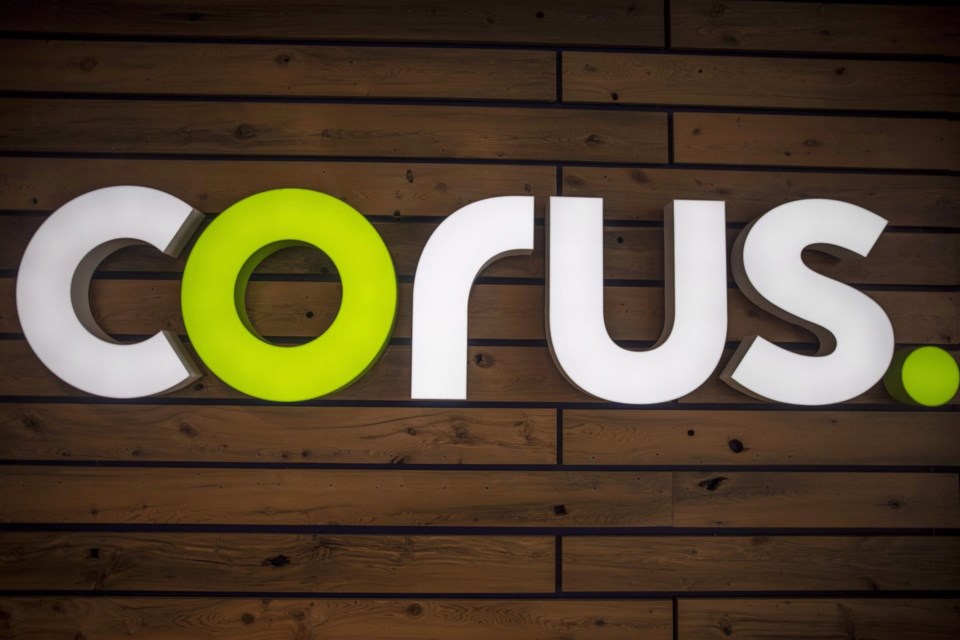TORONTO — Corus Entertainment Inc. slashed seven per cent of employee costs in its most recent quarter, as the company says it will continue to look for savings amid an advertising revenue slump.
The radio and television broadcaster said Thursday that job losses were part of its overall nine per cent reduction in general and administrative expenses during its third quarter, which totalled $10 million in cost savings.
It said it expects to lower general and administrative expenses by 10 to 15 per cent in its fourth quarter compared with the prior year.
"At a high level, the advertising environment remains very challenging, characterized by ongoing uncertainty in the economic environment, an oversupply of digital inventory from foreign competitors, and generally, lower advertising demand on linear television," Corus chief executive John Gossling told analysts on the company's third-quarter earnings call.
The company said it anticipates TV advertising revenue to decline about 20 per cent year-over-year in the fourth quarter as "geopolitical and economic uncertainty" linger.
Gossling, who assumed the solo CEO title earlier this month when co-CEO Troy Reeb stepped down, called Corus' revenue outlook "quite stressed."
"We are seeing advertising investment decisions being made increasingly closer to campaign launch or paused completely as companies await clarity, whether it be on potential supply chain disruptions or consumer confidence impacts on their business," he said.
Gossling added some advertisers are also shifting their buys to platforms beyond traditional television.
"It's a pretty tough market generally out there," he said.
"We haven't seen this kind of impact since COVID. So it's definitely hurting the economy more than it's appearing to."
Corus reported a loss attributable to shareholders of $7.3 million in its third quarter as its revenue fell 10 per cent compared with a year ago. The loss amounted to four cents per diluted share for the quarter ended May 31.
The result compared with a loss of $769.9 million or $3.86 per diluted share in the same quarter last year when Corus took a $960-million non-cash charge.
Revenue totalled $297.8 million, down from $331.8 million a year ago. TV revenue amounted to $274.5 million, down from $308.2 million, while radio revenue was $23.3 million, down from $23.6 million.
Gossling pointed out some reasons for optimism, including an advertising revenue boost from the federal election last quarter, along with a recent CRTC decision that confirmed Corus' eligibility to receive funding from the Independent Local ¾¢±¬´ó¹Ï Fund. However, the company is awaiting details on how much financial assistance it will be able to get.
Despite the challenging economic conditions that he described affecting the entire broadcasting industry, Gossling acknowledged Corus' especially dire situation. He said the company's challenge is figuring out, "How do we get to a place where we're not underperforming the market?"
"We've learned over time that what we're seeing is basically ... our reliance on linear is definitely putting us in a tougher spot," he said.
"We do have digital products, but they're also feeling the pressure. So yeah, I wouldn't necessarily imply that the entire advertising market is seeing the kind of pressure we're seeing, but we're absolutely feeling it."
On an adjusted basis, Corus said it earned six cents per share in its latest quarter compared with an adjusted loss of 10 cents per share a year ago.
Analysts on average had expected a loss of five cents per share, according to LSEG Data & Analytics.
RBC analyst Drew McReynolds said results for the quarter were ahead of forecast mainly due to strong TV margins while the company's fourth-quarter outlook for TV advertising was lower than analyst projections.
"We view the better results but more challenged outlook as largely neutral to a modest positive for the shares at current levels," he said in a note.
This report by The Canadian Press was first published June 26, 2025.
Companies in this story: (TSX:CJR.B)
Sammy Hudes, The Canadian Press



